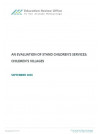Until recently children with behavioural and social needs were referred to and attended one of six health camps situated across New Zealand. Each of the six health camps had an associated school attached. In 2008 ERO evaluated the quality of provisions for children at the health camps and identified significant areas that needed to improve. ERO recommended that the Ministry of Education examine the role of health camps and their schools within the wider network provision of services for students with moderate to severe behaviour difficulties.
Since ERO’s 2008 report, the Ministries of Education and Social Development have worked together to make considerable changes to the governance and provisions for children who have experienced trauma. The health camp schools were closed and the responsibility for helping children that had experienced trauma was given to Stand Children’s Services (Stand).
Stand is a charity funded by the Ministries of Social Development and Education to provide the service for children aged five to twelve years. Children usually stay for about five weeks in one of the seven children’s villages in Whangarei, Auckland, Rotorua, Gisborne, Otaki, Christchurch, and Roxburgh.
This 2016 review is the first review since the reforms to the service. It focuses on how effectively the service responds to the wellbeing and learning of children that have experienced trauma. ERO visited each of the villages in Term 1, 2016 and reviewed the approaches and processes from the time a child is referred until after they transition back to their returning school.
Methodology
A team of four ERO reviewers visited the seven villages (two per site) during March and April 2016. The reviews were scheduled to be undertaken when the intake groups were in the middle of their stay in the village. Data was collected onsite through interviews, observations and document analysis. Interviews included talking with educators, managers, social workers, children and, where possible, whānau/family. System-wide guidance and internal evaluation documents were also reviewed.
The evaluation included a focus on the child’s transition from and back to their own school. Where possible ERO spoke with some of the teachers and leaders from the schools the children had previously returned too.
The evaluation framework was developed in consultation with the Ministries of Education and Social Development, and Stand Children’s Services.
Evaluative question:
How effectively does Stand Children’s Services respond to the wellbeing and learning of children that have experienced trauma?
ERO focused on pre-enrolment practices, the children’s transition into and from the children’s villages, the programmes in the children’s villages, and Stand Children’s Services’ accountabilities, evaluation, and improvements related to the villages.
See Appendix One for further information about the evaluation framework.

